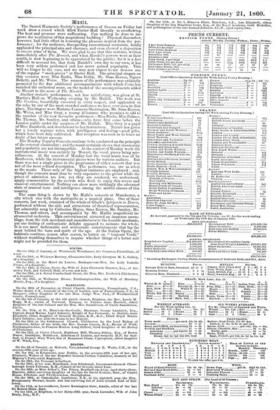Busir.
The Sacred Harmonic Society's performance of Samson on Friday last week drew a crowd which filled Exeter Hall literally to overflowing. The heat and pressure were suffocating. Can nothing be done to im- prove the ventilation of this magnificent building ? Physical discomfort, however, had little effect in lessening the pleasure derived from the per- formance; for the audience, disregarding conventional restraints, loudly applauded the principal airs and choruses, and even showed a disposition to encore some of them. We were glad to see that this oratorio, written immediately after The Messiah, and when Handel's powers were at their zenith, is now beginning to be appreciated by the public ; for it is a fact difficult to account for, that from Handers own day to our own, it has been very seldom performed and has never gained popularity. This 'will no longer be the ease, and we may now expect to see Samson one of the regular "stock-pieces" at Exeter Hall. The principal singers on this occasion were Miss Banks, Miss Dolby, Mr. Sims Reeves, Signor Belletti, and Mr. Weiss. The success of the performance was evidently promoted by the fine additional accompaniments with which Costa has enriched the orchestral score, on the model of the accompaniments added by Mozart to the score of The Messiah.
Another oratorio performance, not less satisfactory, was given at St. Martin's Hall on Wednesday evening by Mr. Hullah. The work was The Creation, beautifully executed in every respect, and applauded to the echo by one of the most crowded audiences we have ever seen in that place. The singers were Madame Lemmens Sherrington, Mr. Sims Reeves, Mr. Weiss, and Miss Gray, a young debutante who promises to add to the number of the now favourite performers—Miss Banks, Miss Palmer, Mr. Thomas, Mr. Santley, and others—who have first come before the London public under the auspices of Mr. Hullah. Miss Gray is a pupil of Miss Rainforth, and does honour to her instructress. Nature has given her a lovely soprano voice, with intelligence and feeling—good gifts, which have been duly cultivated. Her reception was such as to leave no doubt of her future success.
The Monday Popular Concerts continue to be conducted on the principle of the severest classicality ; and the result certainly shows that classicality and popularity are not incompatible. At the concert of Monday week the instrumental music was entirely by Mozart, the vocal pieces being mis- cellaneous. At the concert of Monday last the vocal music was all by Beethoven, while the instrumental pieces were by various authors. But there was not a single piece in the programme of either concert that was not of the most refined description. The performers, too, are as select as the music. Those only of the highest eminence are employed : and, though the concerts must thus be very expensive to the givers while the prices of admission are low, yet they are rendered, we understand, amply remunerative by the crowds who flock to enjoy this severe and classical entertainment. Nothing can show more strikingly the advanced state of musical taste and intelligence among the middle classes of this country. The same thing is shown by Mr. Halle's concerts at Manchester, a city which vies with the metropolis as a musical place. One of those concerts, last week, consisted of the whole of Cluck's lphigenia in Tauris, performed without the aids and attractions of theatrical representation, but admirably sung by Catherine Hayes, Sims Reeves, Mr. Santley, Mr. Thomas, and others, and accompanied by Mr. Halles magnificent in- strumental orchestra. This entertainment attracted an immense assem- blage, from the rich merchant and manufacturer to the humble mechanic, yet one feeling of enthusiastic delight appeared to animate the whole. It is our most fashionable and aristocratic entertainments that lag the most behind the taste and spirit of the age. At the Italian Opera, the habitues continue, season after season, to batten on " toujours Verdi," without troubling themselves to inquire whether things of a better sort might not be provided for them.


























 Previous page
Previous page